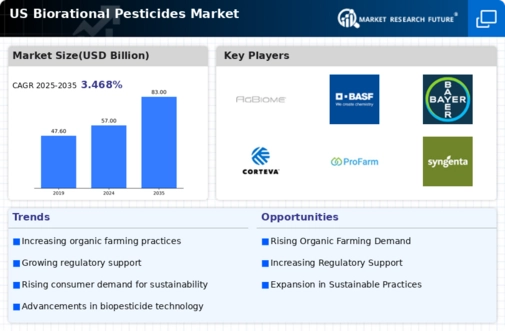Rising Organic Farming Practices
The US Biorational Pesticides Market is witnessing a surge in organic farming practices, which is significantly influencing the demand for biorational pesticides. As organic farming continues to gain traction, farmers are increasingly seeking pest management solutions that comply with organic standards. Biorational pesticides, which are derived from natural sources and are often approved for organic use, are becoming essential tools for organic farmers. According to the USDA, the organic farming sector has seen consistent growth, with organic crop sales reaching over $10 billion in recent years. This trend indicates a robust market opportunity for biorational pesticide manufacturers, as they align their products with the needs of organic farmers striving for sustainable pest management.
Technological Innovations in Biorational Products
Technological innovations are playing a pivotal role in shaping the US Biorational Pesticides Market. Advances in biotechnology and formulation techniques are leading to the development of more effective and targeted biorational pesticides. These innovations not only enhance the efficacy of pest control but also reduce the environmental footprint associated with traditional chemical pesticides. Research institutions and private companies are collaborating to create novel biorational solutions that address specific pest challenges while ensuring safety for non-target organisms. As these technological advancements continue to emerge, they are likely to drive growth in the US Biorational Pesticides Market, as farmers increasingly adopt these cutting-edge products to improve their pest management strategies.
Increasing Consumer Awareness of Health and Safety
The US Biorational Pesticides Market is experiencing a notable shift as consumers become increasingly aware of health and safety concerns related to conventional pesticides. This heightened awareness is driving demand for biorational alternatives, which are perceived as safer for both human health and the environment. According to recent surveys, a significant percentage of consumers express a preference for food products that are free from synthetic chemicals. This trend is likely to continue, as more individuals seek to minimize their exposure to potentially harmful substances. Consequently, manufacturers in the US Biorational Pesticides Market are responding by developing innovative products that align with consumer preferences, thereby enhancing their market presence and competitiveness.
Government Initiatives Promoting Sustainable Agriculture
The US Biorational Pesticides Market is benefiting from various government initiatives aimed at promoting sustainable agricultural practices. Federal and state programs are increasingly supporting the adoption of biorational pesticides through grants, subsidies, and educational campaigns. For instance, the USDA has implemented programs that encourage farmers to transition to organic and sustainable farming methods, which often include the use of biorational pesticides. This regulatory support not only enhances the visibility of biorational products but also fosters a more favorable environment for their adoption. As a result, the US Biorational Pesticides Market is likely to see growth driven by these initiatives, as more farmers recognize the long-term benefits of sustainable practices.
Integration of Integrated Pest Management (IPM) Strategies
The integration of Integrated Pest Management (IPM) strategies is emerging as a key driver in the US Biorational Pesticides Market. IPM emphasizes the use of a combination of biological, cultural, and chemical practices to manage pest populations effectively while minimizing environmental impact. Biorational pesticides play a crucial role in IPM, as they are often less harmful to beneficial insects and the ecosystem. The adoption of IPM practices is being encouraged by agricultural extension services and universities across the United States, leading to increased awareness and utilization of biorational products. This trend suggests that the US Biorational Pesticides Market may experience growth as more farmers implement IPM strategies that incorporate these environmentally friendly solutions.

















